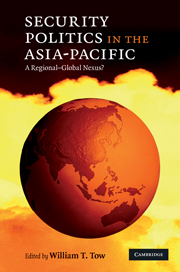16 - The new transregional security politics of the Asia-Pacific
Published online by Cambridge University Press: 05 June 2012
Summary
Introduction
A core aim of this volume, as stated by William Tow in chapter 1, is to study ‘how Asian security politics will affect international security or will, in turn, be influenced by global events and structures’. International relations theories, including theoretical perspectives on regional order, are only partially helpful in addressing this question. The existing literature on the nexus pays far more attention to how global forces shape regional orders, than to examining the other side of the coin, how regions determine global order, a question that ought to figure prominently in a genuinely two-way relationship.
For example, two major recent contributions to the study of regional orders (which have also been discussed in chapters 1 and 2 of this volume), Barry Buzan and Ole Wæver's (2003) Regions and Powers, and Peter Katzenstein's (2005) A World of Regions, both claim the centrality of regions in world politics. They emphatically endorse David Lake and Patrick Morgan's earlier assertion that with the end of the Cold War, regions have become ‘substantially more important’ sites of conflict and cooperation than in the past (Lake and Morgan 1997b: 7). But a closer look at these works (both theory and empirics) shows that they pay far more attention to how systemic forces, especially global power configurations, affect regional security, than to how regional actors and processes, especially outside Europe, shape global security politics and economics.
- Type
- Chapter
- Information
- Security Politics in the Asia-PacificA Regional-Global Nexus?, pp. 301 - 313Publisher: Cambridge University PressPrint publication year: 2009
- 1
- Cited by

